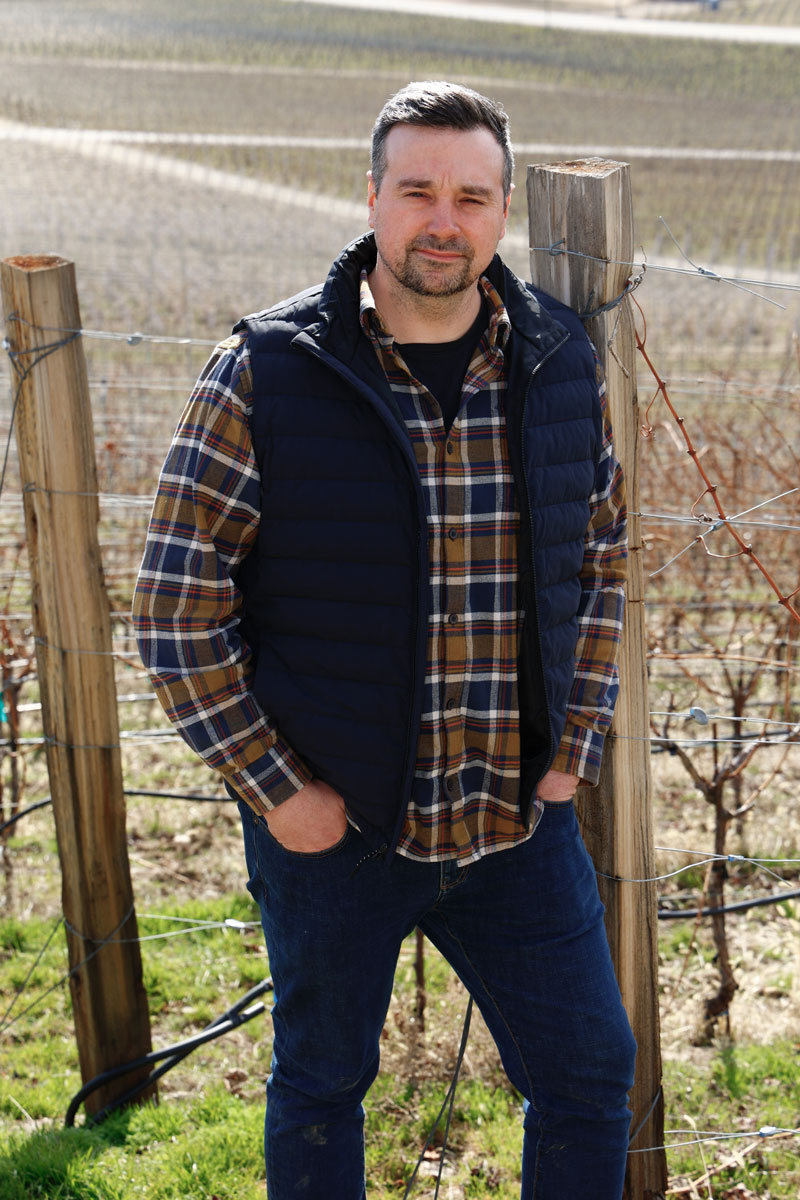
Wine Culture Magazine

Director of farming Mike Anderson is delighted by what he’s seeing in the Phantom Creek vineyards. Photo courtesy of Phantom Creek Estates
Times may be tough in the B.C. wine industry, but Phantom Creek Estates director of farming Mike Anderson has discovered there may be a silver lining after all. In fact, he’s positively delighted. “The extent to which our vineyards have recovered has been quite significant from our initial outlook to where we’re at now,” he says.
At the beginning of the growing season, some blocks and even whole vineyards looked as if they might have to be entirely replanted. “Even in June we were anticipating 60 to 70 per cent mortality,” he says. “Yet the vines pushed through from above the graft and seem to have recovered quite well with some blocks at 80 to 90 per cent survival.”
Even though next year’s still won’t be a full crop, Anderson adds, “We’re pretty hopeful that we’re going to move forward, producing our terroir-driven wines again.”
Like many others in the valley, when the extent of this past year’s devastation from the extreme January freeze became apparent, the winery considered its options, including bringing in fruit from elsewhere. However, Phantom Creek chose instead to opt out of the 2024 vintage.
Anderson points out that the winery has built its significant reputation on the B.C. brand and owning its own vineyards. “We have a lot of single vineyard designated wine. Plus, quality control in our vineyards is pretty important to us,” he says. “So we made the call to stay with making only B.C. wines.”
The breathtaking Black Sage Road winery is also in the fortuitous position of having sufficient inventory on hand to see them through this challenging period. Yet he also fully understands that for some the need to import fruit is truly a matter of survival.
The Okanagan-born viticulturist (who initially trained as a winemaker) says that while the last couple of years have been challenging, work in the vineyard is always a learning process. The decision to put this year’s harvest on pause while undertaking partial replanting affords opportunities to rethink earlier decisions made at a different time, in an era before climate change took hold.
For example, new plantings at the Similkameen Everden vineyard will focus more on Riesling, Pinot Gris and Pinot Noir, which are more cold-tolerant varieties. “It also allows us to re-evaluate some of our planting practices, to make the vines have the best chance of success, that they’re deeply rooted with grafting a little closer to the soil for better protection in colder winters.”
The break also offers time to look at farming practices and continue the development of Phantom Creek’s organic and biodynamic program, with guidance from consultant Olivier Humbrecht. “Healthier vines and well-nourished soil lead to stronger vine vitality. A healthy vine is much better equipped to withstand extreme temperatures, whether it’s the cold of winter or the heat of summer,” Anderson says.
As for lessons learned from the last couple of years, Anderson says after three decades of mainly benign winters, “Maybe we’ve become a little complacent.” Extreme conditions can occur. After all, he reminds us: “We are still growing grapes in Canada.”
THIS POST IS SPONSORED BY:
Phantom Creek Estates
For more info, visit phantomcreekestates.com

Vitis is is an indispensable seasonal guide for vintners, sommeliers and weekend imbibers alike that is dedicated to British Columbia’s rapidly evolving wine culture.

Vitis is is an indispensable seasonal guide for vintners, sommeliers and weekend imbibers alike that is dedicated to British Columbia’s rapidly evolving wine culture.
Copyright © 2025 - All Rights Reserved Vitis Magazine